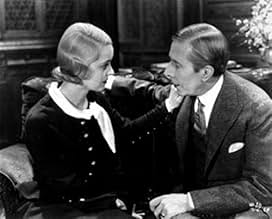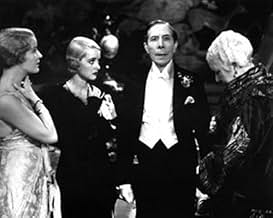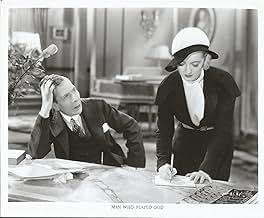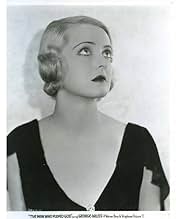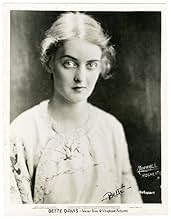VALUTAZIONE IMDb
6,8/10
1290
LA TUA VALUTAZIONE
Aggiungi una trama nella tua linguaAfter losing his hearing, a musician uses lip-reading to help others.After losing his hearing, a musician uses lip-reading to help others.After losing his hearing, a musician uses lip-reading to help others.
- Premi
- 1 vittoria in totale
George Arliss
- Montgomery Royle
- (as Mr. George Arliss)
André Luguet
- The King
- (as Andre Luguet)
Ivan F. Simpson
- Battle
- (as Ivan Simpson)
Charles E. Evans
- The Doctor
- (as Charles Evans)
Fred Howard
- Man
- (scene tagliate)
Symona Boniface
- Woman in Audience
- (non citato nei titoli originali)
Wade Boteler
- Detective
- (non citato nei titoli originali)
Elspeth Dudgeon
- Would-Be Ticket Buyer
- (non citato nei titoli originali)
Grace Durkin
- Kit - First Girl
- (non citato nei titoli originali)
Helena Phillips Evans
- Music Fan with Boy
- (non citato nei titoli originali)
Trama
Lo sapevi?
- QuizThis was the first movie Bette Davis made under her contract to Warner Bros., the studio under which she did most of her best-known work of the 1930s and '40s. Her earlier six films were made for various studios, all of which let her go.
- BlooperWhen Royle goes to his desk after observing the couple in the park, the shadow of the boom microphone dips onto the window curtain behind him.
- Citazioni
Grace Blair: You're my ideal!
Montgomery Royle: I shall always be... your friend.
- ConnessioniFeatured in Hollywood: The Great Stars (1963)
- Colonne sonoreFantaisie-Impromptu in C sharp minor, Op. 66
(1834) (uncredited)
Written by Frédéric Chopin
Played on piano by George Arliss (dubbed by Salvatore Santaella) at the concert
Recensione in evidenza
"Of Human Bondage," (1934) by RKO, to whom Bette Davis was 'loaned' by Warner Brothers, is most often given credit for the beginning of the Queen of the Silver Screen's magnificent acting career. That's not the historical fact, however; this movie, "The Man Who Played God," (1932) must be credited for bringing Bette Davis the recognition as an actor who could hold her own in the lead next to the great screen legend, George Arliss.
Davis was only 23 years of age when filming the show that earned her enough screen status for RKO to even desire her to play the leading, (dare I say) 'lady' next to leading man, Leslie Howard in "...Bondage." Arliss is to be credited for having, more or less, discovered Bette Davis; phoned her & the rest of her acclaimed acting career began.
So many of the critiquers repeat the myth that "... Bondage" is the film that made the world recognize how great an actor Davis was. But, if it was, RKO would have never even wanted her so badly that they 'got her on loan' from the Warners! RKO recognized the talent of Bette Davis in this film: "The Man Who Played God." So should we.
Never underestimate what young adult & teen women can achieve. After all, Mary Shelley wrote "Frankenstein," when she was only 19 years of age in a bet with great poets, Lord Byron & her husband Percy Bysche Shelley. Ann & Nancy Wilson of the rock band "Heart," composed many of their best songs when they were 13 years of age! Davis had already been on Broadway before taking her role in this movie. In fact, her acting career began when she was 15 (in 1923). Davis went on (& on!) to co-lead with Lillian Gish in "Whales of August," (1987), having been in over 100 movies; was the first woman to receive an Oscar at Warner Brothers (for "Dangerous"); the first person to be nominated for an Oscar 5 years in a row; the first woman to receive the AFI's Lifetime Achievement Award; the first person to be nominated for 10 Oscars; the highest paid woman during her prime. She was the epitome of a trail blazer who had to do it "the hard way."
Today, Robert Wagner, Miss Davis's son, Michael, & Miss Davis's closest assistant are key figures who keep Bette Davis's acting excellence alive, through the foundation named after her. Meryl Streep was the first actor to benefit from Davis's foundation. Obviously, the foundation board is taking Davis's acting acumen as a serious measure by which to select recipients of foundation awards & scholarships. Davis herself was the one to recognize Streep's acting abilities.
That's what kind of lady she was: she'd take a step back on the set to boost someone else's acting career; she'd take steps forward to seek out great scriptwriters, directors, cinematographers, etc. She strove to not only circulate her own gifts, but wanted to help others people do so with theirs--and still does so. Her reputation on the set was not as a "star," struck with ego maniacal lights in her fabulously expressive eyes. Instead, she was known to be a pleasure to work with amongst the team workers; and a real tough lady to contend with when she sensed something was amiss in a line, scene, lighting, direction, or co-worker. But, as Robert Wagner tells of Davis, she was truly a fun person to work with because she "always" came to work prepared to put on her very best performance. And when she goofed, she did so with a kind of cute humility that was full of wit enough to crack-up the co-workers she liked.
There's a huge difference between striving for perfection and believing we're perfect. Davis did the former. By the way, she gave her "Jezebel" Oscar to her son, Michael. Steven Spielberg bought her "Dangerous" one that was auctioned (for the second highest price ever) to benefit her foundation. This says to me that Davis herself knew she'd really earned her "Jezebel" Oscar; whereas it was no secret that the masses believed she got the "Dangerous" Oscar as a "consolation prize" for not even being nominated for, "Of Human Bondage."
By my standards, Davis was robbed of her third Oscar for playing the role of Charlotte Vale in "Now, Voyager." In Davis's mind, she was robbed of (what would have been her fourth) Oscar for playing Baby Jane Hudson in, "What Ever Happened to Baby Jane?"
Davis herself credited George Arliss & this movie for jump starting her into untouchable acting achievements. This movie is the movie to own if we want to say we've got a copy of Bette Davis's first great one.
Davis was only 23 years of age when filming the show that earned her enough screen status for RKO to even desire her to play the leading, (dare I say) 'lady' next to leading man, Leslie Howard in "...Bondage." Arliss is to be credited for having, more or less, discovered Bette Davis; phoned her & the rest of her acclaimed acting career began.
So many of the critiquers repeat the myth that "... Bondage" is the film that made the world recognize how great an actor Davis was. But, if it was, RKO would have never even wanted her so badly that they 'got her on loan' from the Warners! RKO recognized the talent of Bette Davis in this film: "The Man Who Played God." So should we.
Never underestimate what young adult & teen women can achieve. After all, Mary Shelley wrote "Frankenstein," when she was only 19 years of age in a bet with great poets, Lord Byron & her husband Percy Bysche Shelley. Ann & Nancy Wilson of the rock band "Heart," composed many of their best songs when they were 13 years of age! Davis had already been on Broadway before taking her role in this movie. In fact, her acting career began when she was 15 (in 1923). Davis went on (& on!) to co-lead with Lillian Gish in "Whales of August," (1987), having been in over 100 movies; was the first woman to receive an Oscar at Warner Brothers (for "Dangerous"); the first person to be nominated for an Oscar 5 years in a row; the first woman to receive the AFI's Lifetime Achievement Award; the first person to be nominated for 10 Oscars; the highest paid woman during her prime. She was the epitome of a trail blazer who had to do it "the hard way."
Today, Robert Wagner, Miss Davis's son, Michael, & Miss Davis's closest assistant are key figures who keep Bette Davis's acting excellence alive, through the foundation named after her. Meryl Streep was the first actor to benefit from Davis's foundation. Obviously, the foundation board is taking Davis's acting acumen as a serious measure by which to select recipients of foundation awards & scholarships. Davis herself was the one to recognize Streep's acting abilities.
That's what kind of lady she was: she'd take a step back on the set to boost someone else's acting career; she'd take steps forward to seek out great scriptwriters, directors, cinematographers, etc. She strove to not only circulate her own gifts, but wanted to help others people do so with theirs--and still does so. Her reputation on the set was not as a "star," struck with ego maniacal lights in her fabulously expressive eyes. Instead, she was known to be a pleasure to work with amongst the team workers; and a real tough lady to contend with when she sensed something was amiss in a line, scene, lighting, direction, or co-worker. But, as Robert Wagner tells of Davis, she was truly a fun person to work with because she "always" came to work prepared to put on her very best performance. And when she goofed, she did so with a kind of cute humility that was full of wit enough to crack-up the co-workers she liked.
There's a huge difference between striving for perfection and believing we're perfect. Davis did the former. By the way, she gave her "Jezebel" Oscar to her son, Michael. Steven Spielberg bought her "Dangerous" one that was auctioned (for the second highest price ever) to benefit her foundation. This says to me that Davis herself knew she'd really earned her "Jezebel" Oscar; whereas it was no secret that the masses believed she got the "Dangerous" Oscar as a "consolation prize" for not even being nominated for, "Of Human Bondage."
By my standards, Davis was robbed of her third Oscar for playing the role of Charlotte Vale in "Now, Voyager." In Davis's mind, she was robbed of (what would have been her fourth) Oscar for playing Baby Jane Hudson in, "What Ever Happened to Baby Jane?"
Davis herself credited George Arliss & this movie for jump starting her into untouchable acting achievements. This movie is the movie to own if we want to say we've got a copy of Bette Davis's first great one.
I più visti
Accedi per valutare e creare un elenco di titoli salvati per ottenere consigli personalizzati
Dettagli
- Data di uscita
- Paese di origine
- Lingue
- Celebre anche come
- Covek koji se dopao Bogu
- Luoghi delle riprese
- Azienda produttrice
- Vedi altri crediti dell’azienda su IMDbPro
- Tempo di esecuzione1 ora 20 minuti
- Colore
- Mix di suoni
- Proporzioni
- 1.37 : 1
Contribuisci a questa pagina
Suggerisci una modifica o aggiungi i contenuti mancanti

Divario superiore
By what name was The Man Who Played God (1932) officially released in Canada in English?
Rispondi
